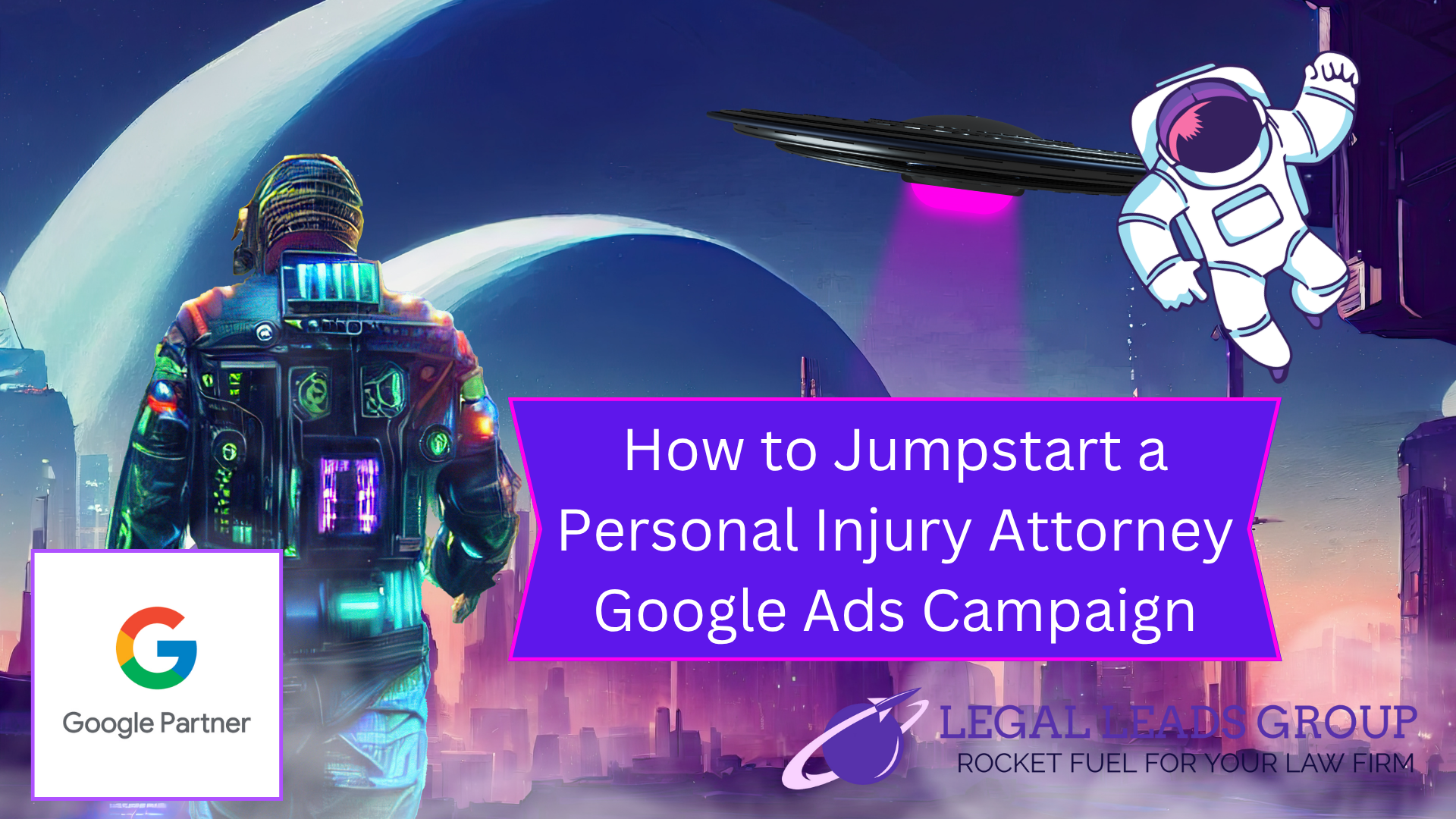Welcome back to our blog. Today’s article and video are about how to jumpstart a personal injury attorney Google Ads campaign. If you’re an avid reader of our blogs, or if you just stopped by for the first time, thanks for taking the time to visit our site. At Legal Leads Group, we pride ourselves on delivering high-quality cases to law firms coast to coast, on a monthly basis. And, while we help all business-to-consumer law firms, we do primarily focus our time on assisting personal injury law firms. Accident injury attorney keywords are expensive because Google prices starting bids based on an opportunity cost standpoint. Simply put, Google knows how much money a plumber or an electrician may make on a simple service job. In turn, Google knows how much money an accident attorney may make on a motor vehicle accident case involving bodily harm with proper insurance in play.
You get the gist of it from the example above: getting quality cases from Google Ads is an expensive undertaking. Now, we’ve published lots of articles and videos about Google Ads and how you can get more cases. In addition, we constantly update our site with fresh PPC and SEO tips focused on personal injury attorney marketing. Today, however, we wanted to focus on one specific issue with personal injury attorney Google Ads and go deep into detail on how and why it is so critical for a campaign’s success.
Our paid search reps unanimously agree that the first step to a successful campaign is getting it to spend. Today, we are going to tackle how to jumpstart a personal injury attorney Google Ads campaign. If you’re looking for more car accident cases and better MVA leads, buckle up.
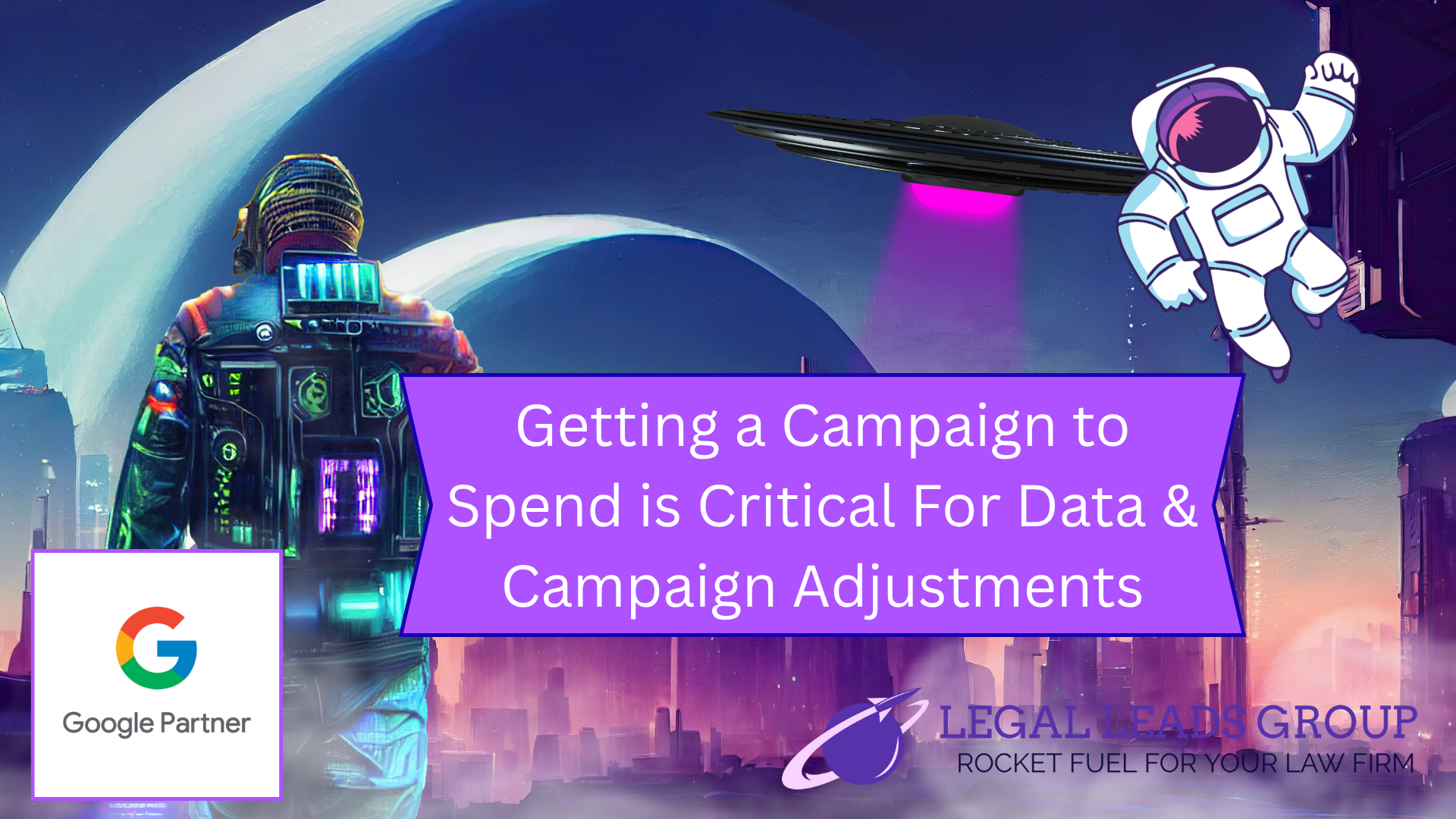
Why is Getting a Personal Injury Attorney Google Ads Campaign to Spend Important?
If you’ve ever taken a stab at managing your own Google Ads campaigns, then you know how hard it is. In addition, if you’ve spoken with a Google Ad rep directly, you know how confusing the conversations get. Upon your initial call with Google, they will tell you how wonderful pmax and broad match campaigns are, then a month or two later, when you’ve blown $300,000.00 and you haven’t received solid cases, they gaslight you and tell you that you need to run exact and phrase match. It seems you are “dammed if you do and dammed if you don’t” with Google.
Want to know something so f’d up? The scenario above is somewhat correct. The problem is that 99% of law firm marketing agencies, even Google Ads reps themselves at Google, fail to explain it correctly. Look, if you’re reading this article, chances are you’re an injury attorney, you work for a personal injury law firm, or you are trying to run ads for a PI lawyer. You will appreciate this next part. Google Ads is a PAIN in the ASS and campaigns suck when you first launch. They are TRASH. Period. You’re attorneys, the hard truth is better than a fairytale lie.
Here is the kicker: Google Ads ROCK for obtaining high-quality personal injury cases once dialed in correctly. In order to “tweak” campaigns and make adjustments, you need data. In simple terms, data points get “unlocked” and campaigns are maneuverable AFTER they have spent money. The trick (and ultimate skill level) is to mitigate your losses in the first few weeks and make adjustments to move campaigns from target CPA to ROAS. Let’s keep going, and remember at any time, you can call us at (805) 273-8791 to learn more about Google Ads for personal injury attorneys.
Tips for Getting a Personal Injury Attorney Google Ads Campaign to Open Up and Spend
When setting up a personal injury attorney Google Ads campaign, the primary challenge is getting the campaign to spend effectively, particularly in the early phases. This step is critical because spending allows the campaign to gather valuable performance data, such as click-through rates (CTR), impression share, and cost per acquisition (CPA). These metrics enable marketers to identify what is working and what needs adjustment. To get a campaign to open up and generate spending, start with a broad targeting strategy, but monitor results closely.
Focusing on high-value keywords like “motor vehicle accident attorney” or “personal injury lawyer near me” can kickstart data collection while driving initial traffic. Pair these efforts with optimized landing pages that have clear calls-to-action tailored to your audience. Additionally, it’s essential to carefully manage your budget to prevent overspending during this experimental phase. Once spending begins to unlock actionable data, you can refine targeting with exact match keywords, eliminate wasted ad spend through negative keywords, and adjust bid strategies to maximize the return on your investment.
Strategic Spending to Gather Data
When launching a Google Ads campaign for personal injury cases, strategic spending is the foundation for success. Unlike other marketing channels, Google Ads thrives on data—and the ability to optimize campaigns depends heavily on accumulating enough measurable results during the early stages. It’s crucial to approach the initial spending phase not as a profit center but as an investment in data collection. Think of this phase as an exploratory mission where you gather the necessary insights to refine your targeting, ad formats, and bidding strategies.
During this period, your goal should be to strike a balance between spending enough to generate significant activity and avoiding excessive losses on irrelevant leads. Start by allocating your budget across various ad groups and focus on high-intent keywords like “car accident attorney” or “workplace injury lawyer.” These keywords often trigger searches by potential clients who are more likely to take action. While impressions and clicks are easily measurable, pay close attention to search terms, as these reveal the exact words users type into Google to find your ads. Use this information to refine your keyword strategy by adding relevant exact-match keywords and setting negative keywords to eliminate wasted ad spend.
Beyond Keyword Data
In addition to keyword data, performance metrics such as Quality Score (a measure of ad relevance) play a critical role in optimizing campaigns in this phase. Ads with higher Quality Scores earn better placements and lower costs per click (CPC), making it imperative to focus on creating compelling, highly relevant ad copy that resonates with potential clients. Ensure your headlines and descriptions mirror users’ pain points—such as needing legal assistance after an accident—and highlight a clear solution like “free consultations” or “no-win, no-fee services.”
Also, leverage geographic targeting to align your ads with your firm’s service area. Spending efficiently means directing funds toward potential clients within your region rather than wasting money on out-of-state clicks. Tools like Google Ads Location Extensions and detailed demographic targeting can help focus ad spend where it matters most.
Finally, use campaign insights to closely track conversion behaviors—whether users are clicking through to your landing page, filling out contact forms, or calling your office. These conversions will serve as a baseline to understand how users are engaging with your ads. Once actionable data is gathered on audience behavior, search patterns, and ad performance, you can transition from focusing on data collection to making informed adjustments that drive higher-quality leads and lower costs over time. Strategic spending not only unlocks data but also sets the stage for a profitable, long-term Google Ads campaign.
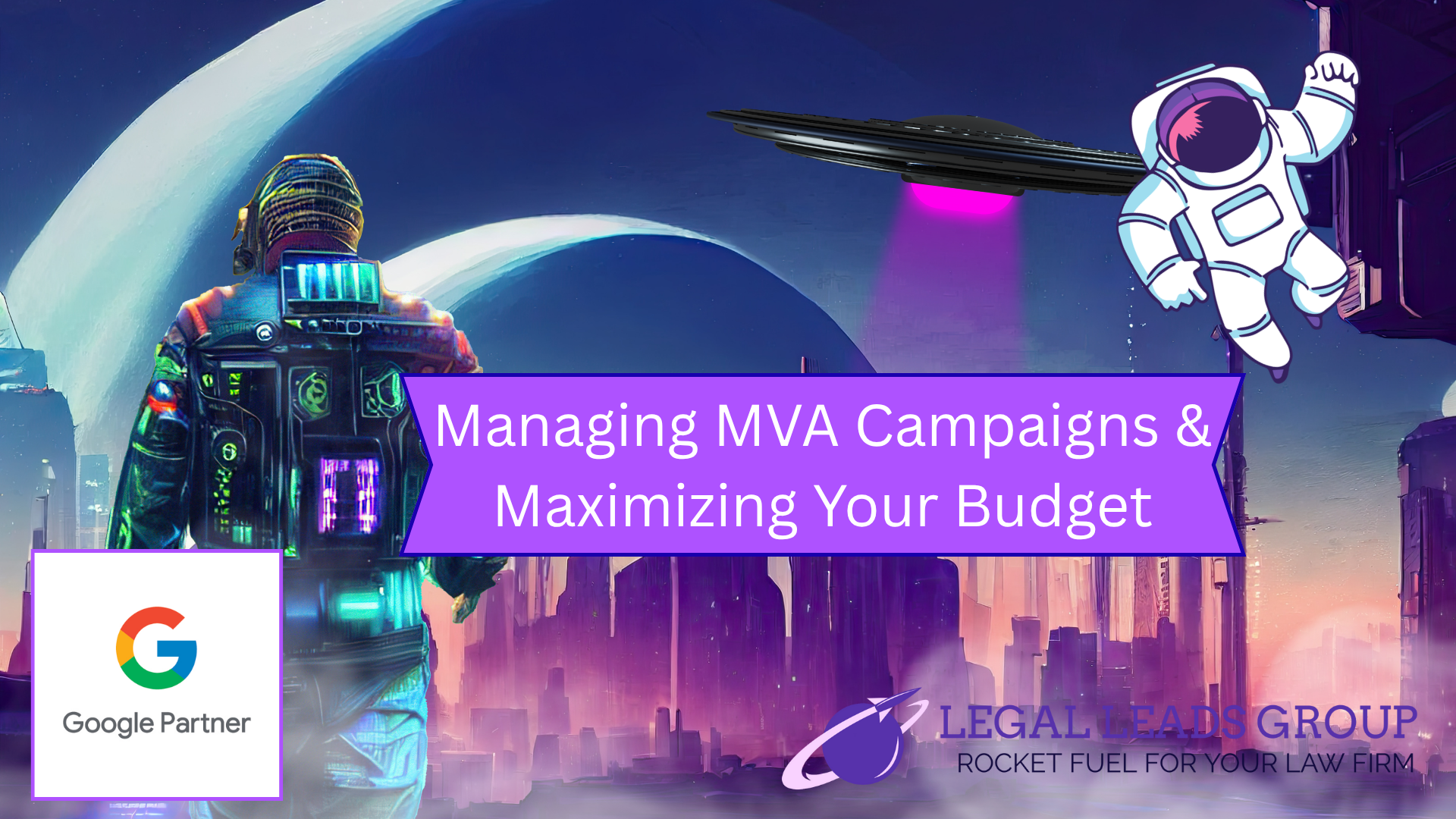
Managing Motor Vehicle Accident Case Campaigns and Maximizing Your Budget
We know that personal injury attorneys love to maximize their profits from vehicle accident cases. MVA’s are the “bread and butter” for PI firms. Motor vehicle accidents are among the most frequent types of personal injury cases, and tailoring your Google Ads campaigns to effectively target these leads can significantly increase your firm’s success rate. With immense competition in this niche and high costs for some competitive keywords, it’s crucial to approach campaign management strategically and allocate resources with precision. Below, we’ll outline key methods to maximize your budget and effectively capture high-quality leads for motor vehicle accident cases.
Use High-Intent Keywords for Improved Relevance
To capture leads that are most likely to convert, focus on high-intent keywords that indicate searchers are actively seeking legal help. Examples include:
- “Car accident lawyer near me”
- “Auto accident attorney”
- “Help with personal injury claims after car accident”
- “Legal advice for car accident victims”
These types of keywords indicate urgent interest in legal services, making them ideal for your campaign. Pair these keywords with compelling ad copy that addresses the needs of accident victims. For example, emphasizing solutions to common pain points—such as recovering medical expenses, lost wages, or handling insurance claims—can deliver better click-through rates (CTR). Ad copy like “Get Compensation for Your Car Accident” or “Free Case Evaluation for Car Accident Victims” often resonates with potential clients.
Incorporate ad extensions to make your ads stand out and provide more information at a glance. Key extensions include:
- Call Extensions: Allow users to contact your firm with one click.
- Site Link Extensions: Direct users to relevant pages, such as “About Us,” “Client Reviews,” or “Get a Free Consultation.”
- Testimonial Extensions: Showcase satisfied client feedback to foster trust and credibility.
Mobile-friendly landing pages are essential here. Since many searches are conducted on smartphones, ensure your landing pages load quickly, are easy to navigate, and highlight the value proposition of your services (e.g., “No-Win, No-Fee”).
Budget Optimization Through Geo-Targeting
Geo-targeting is a critical tool for law firms aiming to focus their ad spend on relevant regions. Because most personal injury cases require victims to hire attorneys located in the same state or city as the accident, targeting by geography ensures that your budget is directed toward individuals within your jurisdiction.
Keep these tips in mind when setting up your geo-targeting:
- Define Your Service Radius: If your firm operates in Los Angeles, CA, set your target area to include Los Angeles County and its surrounding areas while excluding clicks from other states or distant regions.
- Neighborhood-Level Targeting: If specific neighborhoods in your city drive more traffic or conversions, increase your bids in those areas while lowering bids in underperforming areas.
- Cross-State Traffic: If your firm straddles state borders, focus only on cities or regions within driving distance of your location to avoid wasted clicks outside of your service area.
Implement Negative Keywords
Irrelevant traffic can drain your advertising budget quickly and reduce your overall ROI. To combat this, use negative keywords to exclude search terms that don’t match your target audience. For motor vehicle accident campaigns, examples of negative keywords might include:
- “Cheap car insurance”
- “Auto repairs after accidents”
- “Free consultation with insurance agent”
By carefully crafting your negative keyword list, you can filter out traffic that isn’t likely to convert, ensuring your paid clicks are limited to individuals truly seeking legal services.
Maximize ROI Through Remarketing Ads
Not every user who clicks on your ad will convert immediately, but that doesn’t mean they’re not interested in your services. Remarketing ads allow you to reconnect with individuals who visited your site but didn’t take action. These ads can remind prospects of your firm’s services and keep your brand visible as they continue to weigh their options.
Use remarketing ads effectively in the following ways:
- Highlight Special Offers: Remind visitors about free consultations, deferred fees, or your “No-Win, No-Fee” guarantee.
- Use Testimonials: Incorporate social proof to build trust and credibility with users who may be hesitant to commit.
- Create Urgency: Use phrases like “Don’t Miss Out on Your Legal Rights—Act Now!” to drive conversions.
Remarketing is especially effective for users who’ve shown strong interest, such as visiting your contact form or spending significant time on your services pages.
Conversion Tracking and Continuous Optimization
Data is the cornerstone of any successful Google Ads campaign. Continuously monitor conversion performance to understand which keywords, ads, and geographic locations are delivering the best ROI. Some tips for leveraging this data include:
- Focus on High-Performing Keywords: Shift your budget toward keywords driving the most form submissions, phone calls, and consultations related to motor vehicle accident leads.
- Bid Adjustments: Lower bids on underperforming terms and increase your maximum CPC for keywords with better conversion rates.
- A/B Testing for Ad Copy: Test different versions of ad headlines, descriptions, and calls-to-action to determine which resonate best with your audience. For example, test phrases like “Speak to an Auto Accident Specialist Today” versus “Get Compensated for Your Auto Accident Now!”
Leverage Call Tracking for Enhanced Results
Since many leads for personal injury cases begin with a phone call, using call tracking software is essential. This tool can help you measure which keywords and ads drive phone inquiries, ensuring your campaign prioritizes tactics that connect prospects directly to your intake team. With call analytics, you can also identify trends such as peak call times and refine your ad scheduling accordingly.
Maximizing your Google Ads budget for motor vehicle accident campaigns doesn’t happen overnight, but with continuous optimization, smart targeting, and an unwavering focus on converting high-quality leads, you can ensure every dollar spent delivers meaningful results for your practice.
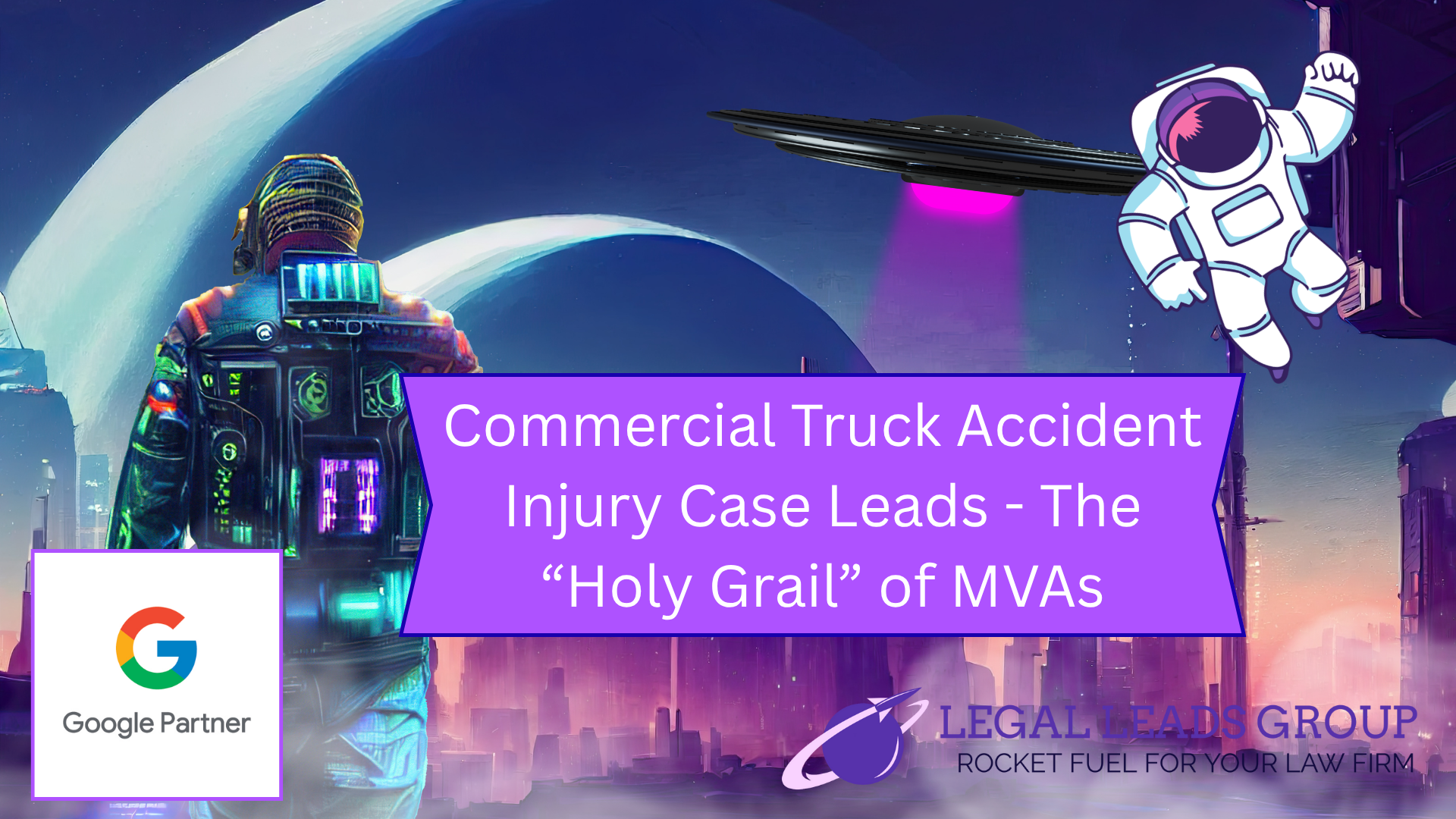
How to Prioritize Commercial Truck Accident Cases within Your Google Ads Campaigns
Commercial truck accident cases present a lucrative opportunity for personal injury lawyers due to the severe injuries, significant damages, and higher settlement values associated with these incidents. Success in targeting truck accident victims through Google Ads hinges on implementing a niche-specific strategy that incorporates precise keywords, persuasive ad copy, smart budget allocation, and performance tracking. Below is a detailed guide on how to prioritize commercial truck accident leads to maximize your campaign ROI.
Focus on Long-Tail and High-Intent Keywords
When prioritizing truck accident cases, selecting the right keywords is paramount. Unlike general auto accident searches, truck accident inquiries often involve unique terminology that signals high intent. Long-tail keywords are especially effective because they’re specific, have lower competition, and attract users who are already searching for specialized legal help.
Examples of effective truck accident-related keywords include:
- “Truck accident injury lawyer near me”
- “Legal help after semi-truck collision”
- “Big rig crash attorney experts”
- “Trucking company negligence claims”
- “Compensation for commercial vehicle accident victims”
Ensure your campaigns are segmented to prioritize truck accident keywords separately from general auto accident keywords. This structure allows you to custom-tailor your ads, landing pages, and bidding strategy, ensuring that truck cases receive prime focus in your budget allocation.
Create Ad Copy That Speaks to the Unique Nature of Truck Accident Cases
Commercial truck accidents differ significantly from passenger car accidents. Victims often face more complex legal and insurance issues, such as navigating commercial insurance liability or proving negligence against trucking companies. Highlight these complexities in your ad copy to demonstrate your firm’s expertise and differentiate yourself from competitors who might focus on general personal injury cases.
Incorporate language like:
- Experience in Commercial Truck Accidents: “Expert legal representation for semi-truck crashes and big rig accidents.”
- Large Insurance Claims: “Truck accidents often involve corporate insurance disputes—let us fight for the settlement you deserve.”
- Holding Trucking Companies Accountable: “We specialize in claims against negligent trucking companies and their drivers.”
- No-Win, No-Fee Guarantees: “No upfront costs—only pay if we win your truck accident case.”
Examples of effective call-to-action phrases:
- “Get Legal Help for Your Truck Accident Today—Call Now!”
- “Injured in a Big Rig Accident? Claim Your Maximum Compensation.”
- “Expert Lawyers for Victims of Semi-Truck Collisions—Free Case Review Available!”
Combine these CTAs with ad extensions like location details, call buttons, testimonials, or links to dedicated truck accident information pages on your website. This builds user trust and improves ad performance.
Strategic Budget Allocation for Truck Accident Leads
Truck accident cases tend to offer higher ROI than standard car accident cases, making optimized budget allocation a key factor in your success. Allocate a larger share of your Google Ads budget specifically to truck accident campaigns, as leads from these cases are likely to result in higher settlement fees and a greater return on your investment.
Here’s how to optimize your budget:
- Manual CPC Bidding: Use manual bidding for truck accident keywords to ensure your budget focuses on high-value terms that drive conversions. Raise your maximum bid for critical keywords like “semi-truck accident attorney” or “big rig crash lawyer.”
- Segment Your Campaigns: Separately allocate budgets for truck-related ad groups versus other personal injury categories (e.g., car accidents or general slip-and-falls). This ensures truck accident campaigns receive appropriate resource prioritization.
- Geographic Targeting: Concentrate ad spend near transit-heavy regions, major highways, shipping hubs, and industrial areas where truck accidents are more likely to occur. Avoid wasting budget in areas with low traffic volume for commercial vehicles.
Leverage Location-Based and Time-Sensitive Targeting
Because commercial truck accidents frequently occur in transit-heavy zones or freight corridors, using location-based targeting can significantly improve your campaign’s efficacy. Major trucking routes such as interstates, distribution hubs, freight shipping areas, and industrial districts are prime regions to focus on. Adjust your location settings to bid higher in these targeted areas.
Additionally, time-sensitive targeting can amplify your campaigns. Many truck accidents occur during business hours or early mornings when drivers transport goods for commercial purposes. Adjust your ad schedules to prioritize your campaign during high-traffic hours to capture these leads at the right moments.
Optimize for Mobile Searches
Commercial truck accident victims—like other personal injury leads—often search for legal help using mobile devices immediately after an incident occurs. Your campaigns must cater to mobile users by ensuring both your ads and landing pages are optimized for mobile functionality:
- Quick Load Times: Mobile searches demand fast-loading pages. Optimize your landing pages to reduce load times.
- Mobile-Friendly Design: Ensure forms, Call-to-Action buttons, and contact options are easy to use on smaller screens.
- Click-to-Call Options: Include direct call-to-action buttons that allow users to contact your firm with one tap from their smartphone.
A mobile-first strategy ensures your firm captures leads during the crucial post-accident moments when victims are most likely to search for representation.
Leverage Conversion Tracking and Analytics
Tracking your ad performance is essential to maximizing ROI from commercial truck accident campaigns. Use tools like Google Ads conversion tracking to measure the effectiveness of each ad group, keyword, and campaign setting. Focus on capturing specific conversions such as:
- Phone Calls: Many truck accident victims prefer to speak directly with an attorney rather than filling out forms online. Use call tracking software to identify phone leads generated from your ads.
- Form Submissions: Track inquiries made via your truck accident landing pages to measure the impact of campaigns directly targeting this niche.
- Consultation Scheduling: Ensure all conversions related to scheduling free consultations or case evaluations are being tracked accurately.
By continuously monitoring campaign data, you can:
- Prioritize High-Performing Keywords: Shift budget toward terms driving the most conversions.
- Refine Ad Copy: Review CTR metrics to identify which CTAs and value propositions resonate most with your audience.
- Adjust Bids: Optimize bidding strategies to maximize visibility for truck accident queries while minimizing costs for underperforming keywords.
Build Trust Through Social Proof and Expertise
Truck accident cases are complex, and victims need confidence that your firm is equipped to handle these high-stakes claims. Incorporate elements of social proof into your campaigns to build credibility:
- Client Testimonials: Feature truck accident-related reviews on your landing pages and ads to show past success stories.
- Proven Case Results: Highlight specific truck accident cases you’ve won, emphasizing settlement amounts. E.g., “Recovered $500,000 for a victim of a negligent truck driver.”
- Content Marketing: Offer educational resources on your site explaining topics like trucking liability, commercial insurance disputes, or interstate trucking regulations.
This not only differentiates your firm but also establishes authority in handling truck accident claims.
By prioritizing long-tail keywords, crafting personalized ad copy, optimizing your budget, and leveraging geo-targeting, your firm can dominate the commercial truck accident niche within Google Ads campaigns. With proper performance monitoring and a focus on building credibility, you’ll consistently attract high-value leads while positioning your practice as an expert in this lucrative area of personal injury law.
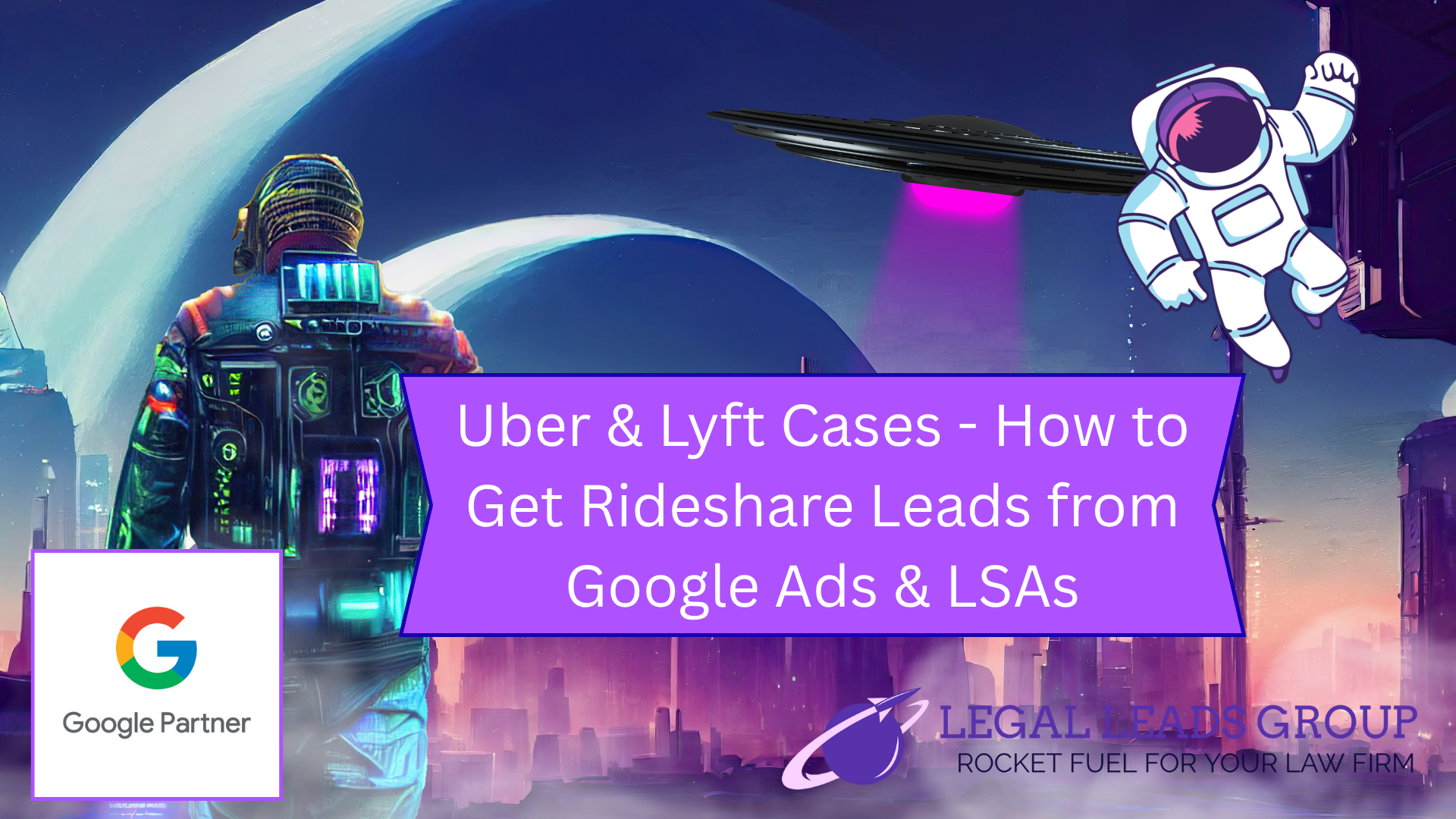
Getting Your Share of Uber and Lyft Rideshare Accident Injury Leads
The increasing reliance on rideshare services like Uber and Lyft has brought unique challenges and opportunities in the legal industry. Rideshare accident cases are an emerging niche that requires a focused and specialized approach to effectively target potential clients through Google Ads campaigns. Law firms that strategically position themselves as experts in rideshare-related legal issues can tap into a growing demand and attract valuable leads. Below is a comprehensive guide to maximizing the effectiveness of your campaigns in this niche.
Create Specialized Keyword Targeting
Developing a rideshare-focused keyword strategy is critical for standing out among competitors. Unlike general auto accident campaigns, the language and search intent for rideshare cases often include references to specific services or legal complexities unique to Uber or Lyft. Some high-performing keywords include:
- “Uber accident lawyer near me”
- “Help after Lyft crash injury claims”
- “Who’s liable for rideshare accident damages?”
- “Passenger injury claims with rideshare insurance coverage”
- “Legal representation for Uber driver negligence”
These keywords address the unique hurdles rideshare accident victims face, such as determining liability in cases involving drivers and rideshare companies or tackling the complexities of app-specific insurance coverage.
Segment your campaigns by intent, such as keywords targeting “rideshare passengers,” “injured Lyft/Uber drivers,” or “claims against rideshare companies.” By splitting these categories, you can craft more personalized ad copy tailored to user needs.
Craft Highly Focused and Persuasive Ad Copy
Ad copy is where you communicate your firm’s value and expertise, particularly in a niche as competitive as rideshare accidents. Use language that addresses key concerns rideshare accident victims might have, and offer tailored solutions that position your firm as the trusted authority for their specific situation.
For example, include ad copy that highlights:
- Your understanding of the legal complexities of rideshare claims.
- Expertise in resolving disputes with rideshare insurance policies.
- Deep knowledge of app-related driver behaviors (e.g., distracted driving due to notifications or GPS use).
Effective call-to-action (CTA) phrases might include:
- “Get Compensation for Your Uber or Lyft Accident.”
- “Injured During a Rideshare Trip? Consult a Trusted Attorney Today.”
- “Don’t Face Uber’s Insurance Alone—Call Us for Free Legal Help.”
Additionally, highlight unique selling points (USPs) like “No-Win, No-Fee Representation,” “Fast and Stress-Free Claims,” or “Specialized Legal Expertise for Rideshare Cases.” Use urgency to motivate clicks, such as: “Act Now—Protect Your Rights Before it’s Too Late!”
Optimize Campaign Settings for Rideshare Leads
Rideshare accidents are heavily concentrated in urban regions where services like Uber and Lyft are frequently used. To ensure you’re targeting the right audience, leverage location-based ad targeting:
- Urban Areas: Focus on major metropolitan regions or cities where rideshare services are widely used, such as New York City, Los Angeles, Chicago, or Atlanta.
- Transit Hubs and Nightlife Zones: Airports, train stations, entertainment districts, and areas with a high volume of bars or restaurants are prime locations where rideshare accidents are likely to occur.
- Geo-Specific Optimization: Create bidding rules to prioritize ads in locations where you’ve seen higher conversion rates or where your legal practice is more visible.
Since rideshare users often search for attorneys immediately after an incident using their smartphones, device-specific targeting is critical. Invest more of your ad budget on mobile-first campaigns, ensuring your landing pages are optimized for mobile devices. Include click-to-call buttons for immediate contact and keep forms streamlined for mobile users.
Leverage Social Proof and Credibility
Establishing trust is essential in legal advertising, especially for rideshare accident cases where individuals may feel overwhelmed or uncertain about their next steps. To stand out from competitors, showcase your firm’s success stories and social proof:
- Client Testimonials: Feature positive feedback from rideshare accident victims you’ve successfully represented.
- Case Results: Highlight settlements or verdicts achieved in rideshare-related claims. Specificity adds credibility—e.g., “Secured $250,000 for an Uber passenger after collision injuries.”
- Awards and Recognition: Include certifications, honors from legal associations, or media mentions to affirm your expertise.
Adding these elements to your ad copy or landing pages can build confidence among potential clients and encourage conversions.
Remarketing for Lead Recovery
A significant number of users interested in hiring a rideshare accident attorney may not convert on their initial visit. Remarketing campaigns ensure you stay top of mind for prospects by re-engaging them after their first interaction with your ad or website.
Use remarketing ads to target specific behaviors, such as users who:
- Visited your rideshare accident service page.
- Started filling out a consultation form but didn’t complete it.
- Viewed your blog or educational resources on rideshare accident liability.
To make these ads more personalized, include phrases like:
- “Still Looking for Legal Help After Your Rideshare Accident?”
- “Don’t Let Uber or Lyft’s Insurance Providers Delay Your Compensation.”
Remarketing ads can be effective in converting passive prospects into active leads, as they remind users of your expertise and provide additional incentives such as free consultations or expedited case reviews.
Track Performance and Continuously Optimize Your Campaigns
The rideshare accident niche is growing and evolving, so it’s critical to track the effectiveness of your campaigns and adapt based on the data. Key metrics include:
- Conversion Rates: Measure how many users call your firm, submit a form, or schedule a consultation after clicking on your ad.
- Click-Through Rates (CTR): Identify which keywords and ad copy generate the highest engagement.
- ROI: Track the profitability of your campaigns by comparing costs per click (CPC) and costs per acquisition (CPA) to actual client revenue.
Use tools like Google Ads’ campaign performance reports or third-party analytic platforms to pinpoint opportunities for cost-saving adjustments, higher-quality bidding strategies, or improving targeting precision. Regular A/B testing for your ad copy, keywords, and landing pages ensures ongoing optimization for greater success.
Positioning your firm as a leader in Uber and Lyft rideshare accident cases requires establishing authority in this growing niche while leveraging technology and data to capture leads effectively. By cultivating focused campaigns tailored to the needs of rideshare victims, building trust through professionalism and success stories, and collecting actionable data to refine your strategy, your firm can secure high-value leads and grow its reputation as a rideshare accident expert.
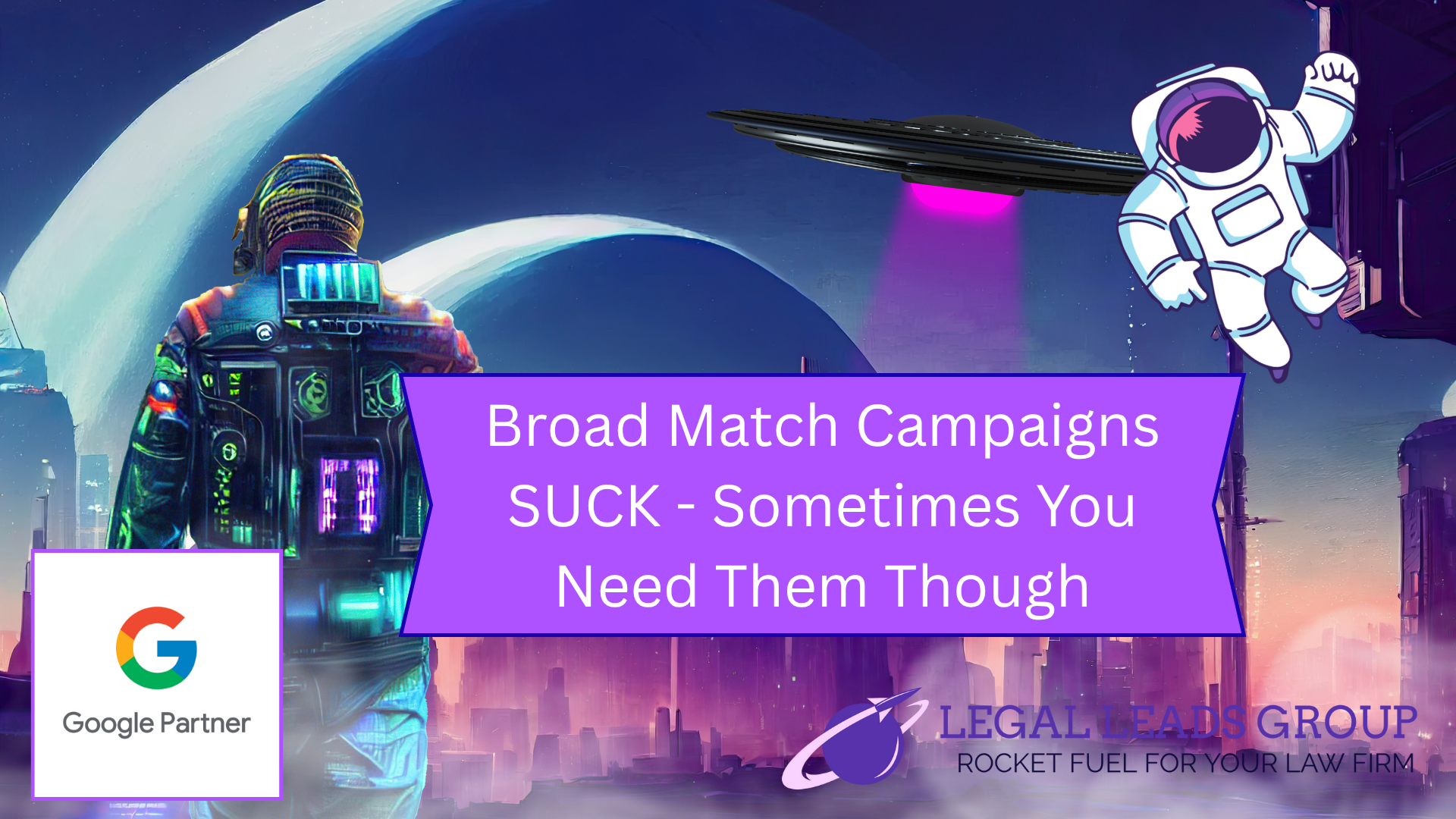
When and When Not to Utilize Broad Match Campaigns for Accident Injury Cases
Broad match campaigns in Google Ads can be a powerful tool for accident injury attorneys looking to expand their reach and capture leads. However, this match type comes with both advantages and disadvantages. Broad match allows your ads to appear for a wide variety of search queries related to your chosen keywords, often uncovering opportunities you might not have explicitly targeted. On the flip side, it can lead to higher costs and less-qualified traffic if not used strategically.
Understanding when and when not to utilize broad match campaigns is critical to optimizing your advertising budget and ensuring high-quality lead generation. Below is an in-depth guide exploring the strategic use of broad match campaigns for accident injury cases.
When to Utilize Broad Match Campaigns
1. Expanding Reach to Discover New Opportunities
Broad match campaigns are particularly useful for expanding reach and identifying potential search terms that you may not have anticipated during keyword research. For example:
- If you target “car accident lawyer,” broad match may capture related searches like “wreck attorney near me” or “auto accident legal help,” which may not have been part of your initial focus.
- Broad match gives visibility into variations and synonyms, potentially leading to keywords you can later narrow down into exact or phrase-match campaigns.
This strategy can be especially valuable for new accident injury ad campaigns where your firm is still testing or determining which keywords perform well.
2. Targeting Emerging Niches
Broad match can help accident injury attorneys discover keywords in emerging legal niches. For example:
- Rideshare Accident Cases: A keyword like “rideshare attorney” could surface searches related to Uber, Lyft, or similar services that you may not have directly targeted.
- Truck Accident Cases: Targeting “truck accident lawyer” may yield results about “semi-truck collisions,” “big rig accident help,” or “freight carrier negligence cases.”
This approach works well when aiming to broaden campaigns into subcategories of personal injury law that may have less competition and higher ROI.
3. Brand Awareness Campaigns
Broad match campaigns can serve as a tool for building brand awareness across a large audience. While conversions might not be the primary focus here, the goal is to increase visibility for your firm in search results related to accident injury cases. For example:
- Using generic keywords like “injury law firm” could capture a wide net of traffic and help build recognition for people who may not be ready to hire an attorney immediately but bookmark your firm for future use.
- In low-competition regions (e.g., rural areas where not many firms target Google Ads), broad match campaigns may draw a larger audience without significant cost concerns.
4. High Budget Availability
Broad match campaigns are most appropriate when your law firm has a significant ad budget to test different keywords, audiences, and search queries. Since broad match captures a wider range of traffic, you’ll need resources to filter out irrelevant clicks via negative keywords and ongoing optimizations.
5. Using Broad Match with Smart Bidding Strategies
Broad match pairs well with Google’s automated bidding strategies like Target CPA (Cost Per Acquisition) or Maximize Conversions. In these scenarios, Google Ads uses machine learning to prioritize conversions from relevant search queries while avoiding unqualified traffic. This mitigates some of the risks associated with broad match and helps refine your audience targeting.
When NOT to Utilize Broad Match Campaigns
1. Highly Competitive Practice Areas
Broad match campaigns may not be valuable for injury cases in competitive markets, such as car accident claims in metropolitan areas. Broad match in these settings often attracts irrelevant traffic and drives up costs due to competition from firms targeting similar keywords:
- Example: Targeting “car accident lawyer” on broad match in cities like Los Angeles or New York could result in high CPCs (Costs Per Click) for unrelated searches like “cheap car accident legal aid” or “car insurance lawyers.”
- Broad match in competitive regions also risks wasting budget on queries that don’t align with your ideal audience, such as users researching general auto law without the intent of hiring an attorney.
2. Limited Budget Campaigns
If your advertising budget is restricted, broad match is risky because it spreads your budget across irrelevant queries. In these cases, exact or phrase match campaigns are better suited to ensure every dollar goes toward high-quality, targeted traffic. For example:
- Instead of targeting “accident lawyer” on broad match, using phrase match (“car accident lawyer”) guarantees your ads only appear for users whose query aligns closely with this term.
3. Seeking High-Quality Leads
Broad match campaigns tend to generate more traffic, but much of it may come from casual searches or individuals who aren’t serious about hiring an attorney. When your focus is on securing qualified leads for accident injury cases—such as individuals actively seeking legal representation—it’s better to use exact match or highly refined phrase match campaigns.
4. Unclear or General Keyword Intent
Broad match can hurt performance when keywords have ambiguous or varied intent. For example:
- Targeting “injury lawyer” on broad match could result in your ads being served for searches like “dog bite insurance help” or “workplace injury claims,” which may not align with your area of expertise in accident cases.
- For industry-specific terms like “semi-truck accidents” or “rideshare collisions,” use exact or phrase matches to avoid wasting ad spend on terms unrelated to your core practice.
5. No Negative Keywords in Place
Broad match campaigns require aggressive use of negative keywords to prevent ads from showing for unrelated searches. For example:
- Without negative keywords, targeting “car accident lawyer” might trigger ads for “car insurance claim advice,” “DIY personal injury claims,” or even generic searches like “how to sue someone after a crash.”
- Broad match campaigns become counterproductive if irrelevant traffic isn’t actively filtered, as they can drain resources quickly without producing valuable leads.
Tips for Managing Broad Match Campaigns Effectively
- Incorporate Negative Keywords: If you choose broad match, update negative keyword lists regularly to filter out unrelated traffic. For instance, add terms like “DIY,” “cheap,” “free,” or “non-lawyer advice” to prevent your ads from appearing for prompts irrelevant to your firm’s high-value services.
- Utilize Smart Bidding: Combine broad match campaigns with automated bidding strategies like Target CPA or Maximize Conversions to ensure Google’s algorithm prioritizes searches more likely to convert.
- Monitor and Adjust Regularly: Keep a close eye on campaign data to identify click patterns that reflect poor quality leads. Pause keywords generating irrelevant impressions or update match types to focus traffic more effectively.
- Start Small: Test broad match campaigns with a limited budget before scaling. Use insights from these tests to refine your strategy and shift resources toward high-performing terms.
- Combine Broad Match with RLSA: Use Remarketing Lists for Search Ads (RLSA) to retarget past visitors when using broad match. This ensures your ads appear for users who’ve previously engaged with your site and are more likely to convert.
Getting Better Quality Case Leads Through Wide Open Broad Match Campaigns
While broad match campaigns have the potential to uncover new opportunities for accident injury cases, they come with inherent risks if not used strategically. They’re best utilized for testing new markets, emerging niches, or brand awareness efforts where precision targeting isn’t the primary goal. However, for highly competitive markets or firms seeking to maximize ROI through high-quality leads, exact or phrase match campaigns are often more effective.
Successful broad match campaigns depend on balancing reach with relevance—and ongoing optimization is essential to ensure your resources are spent wisely and generate real value for your firm.
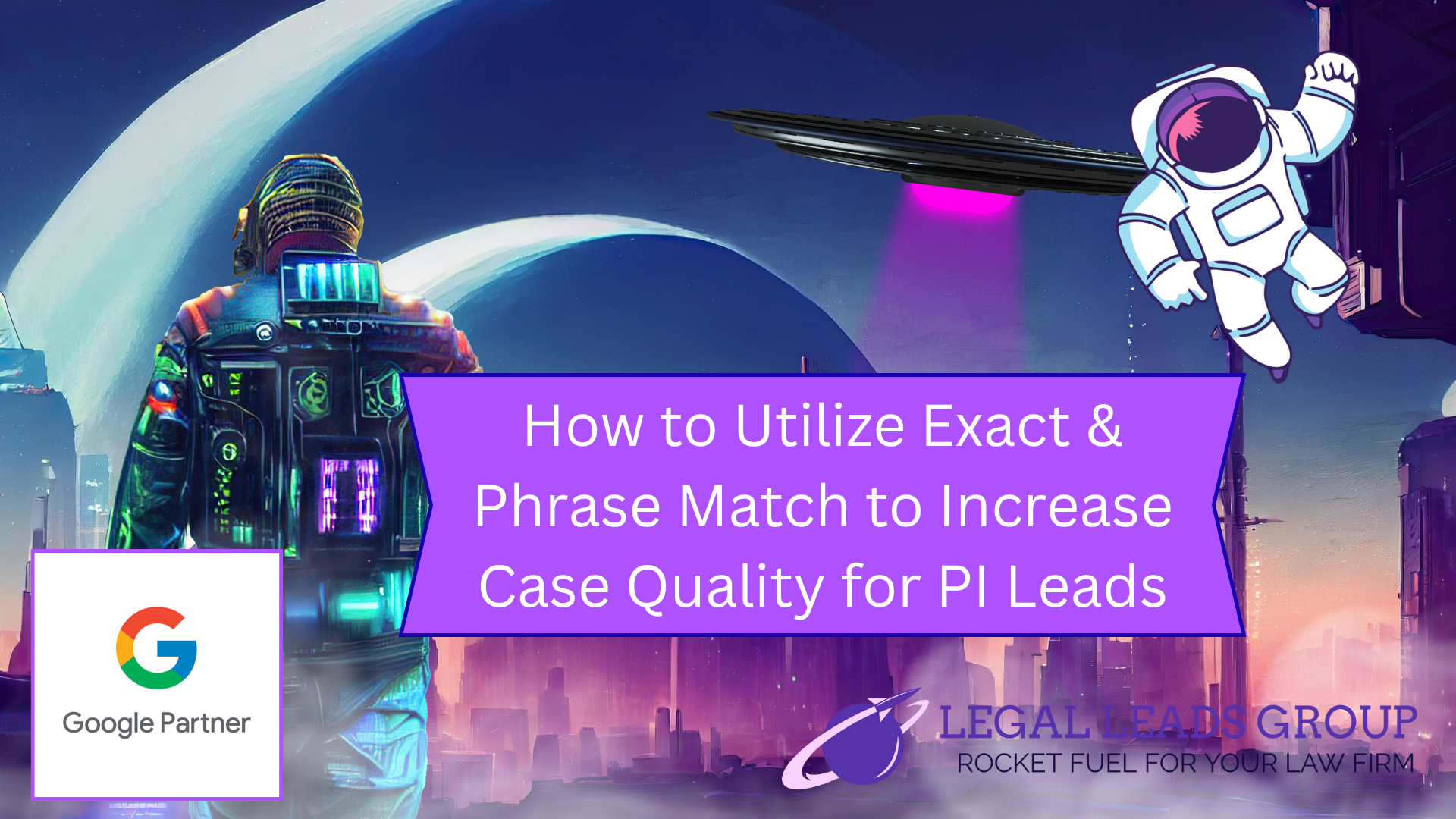
Incorporating Exact Match and Phrase Match to Increase Quality of Leads
In Google Ads, match types play a critical role in determining who sees your ads and how relevant those views are to your business goals. For personal injury attorneys, targeting accident injury cases with Exact Match and Phrase Match can significantly enhance the quality of leads you attract while reducing wasted ad spend. These precise match types ensure that users searching for legal help are likely to fall into your ideal audience—those actively seeking professional representation for their injury claims.
Below, we’ll explore the advantages of exact and phrase match strategies, when to use each, and how they contribute toward optimizing your campaign for better lead quality.
Benefits of Exact Match Campaigns
Exact Match allows your ads to appear only when a user’s search query matches your keyword exactly, giving you ultimate control over targeting. By using this match type, you’re reserving your budget for the most relevant and high-intent searches, ensuring that the traffic your ads generate is closely aligned with your practice goals.
Key Benefits of Exact Match:
- Pinpoint Targeting:
Exact match ensures your ads appear only for specific queries relevant to your chosen keywords. For instance:- Keyword:
car accident lawyer - Match: Only searches for “car accident lawyer” lead to your ad being displayed.
This effectively filters out traffic that doesn’t align with your ideal customer profile (e.g., general searches like “legal advice after car accident”).
- Keyword:
- Eliminating Wasteful Clicks:
Exact match reduces the likelihood of irrelevant clicks that eat into your budget without delivering qualified leads. You avoid scenarios where users click on your ad for queries like “cheap injury lawyers,” “free legal help,” or “accident claim DIY solutions.” - Increasing Conversion Rates:
By narrowing ad visibility to highly relevant queries, exact match campaigns often lead to higher engagement rates. These users are already searching for exactly what you’re offering, increasing the likelihood of contact form submissions, calls, or consultation bookings. - Better Budget Allocation:
When targeting only high-intent searches, every dollar spent goes toward users who are actively seeking representation. This maximizes your ROI and ensures campaigns drive meaningful results rather than inflating impressions without conversions.
Benefits of Phrase Match Campaigns
Phrase Match offers a balance between precision and flexibility, ensuring your ads appear for search queries that maintain the meaning/context of your keyword while allowing for additional terms before or after your designated phrase. This match type is ideal for capturing slightly broader searches while preserving high relevance.
Key Benefits of Phrase Match:
- Broader Reach Without Sacrificing Intent:
Phrase match provides flexibility to capture variations of your target keyword when users add qualifiers or modifiers. For example:- Keyword:
"car accident lawyer" - Match: Covers queries like “best car accident lawyer in Texas” or “car accident lawyer for serious injuries.”
It won’t display ads for unrelated keywords like “traffic accident advice” or “car insurance attorney,” which helps maintain relevance while expanding your audience.
- Keyword:
- Improved Keyword Coverage:
Phrase match is excellent for capturing long-tail search queries, which often signify higher purchase intent. For example:- Keyword:
"truck accident attorney" - Match: Covers detailed consumer inquiries like “experienced truck accident attorney near me” or “semi-truck collision attorney Dallas.”
These searches tend to indicate a user who is closer to hiring an attorney compared to generic short keywords.
- Keyword:
- Efficient Data Collection for Optimization:
Phrase match campaigns generate a wealth of search query data, showing how potential clients interact with your keywords. Use these insights to refine exact match keywords or update your negative keyword list (e.g., excluding terms like “cost of hiring truck accident lawyer”). - Flexibility for New Target Areas:
When expanding into new regions or niches, phrase match is an excellent way to test the effectiveness of broader keyword phrases without risking your budget on irrelevant traffic.
When and How to Use Exact Match and Phrase Match
When to Use Exact Match:
- High-Value Practice Areas:
Use exact match for personal injury cases with high ROI, such as truck accident litigation, wrongful death claims, or severe injury cases. These are expensive leads, and exact match ensures your resources are spent on people searching directly for these services. - Competitively Priced Keywords:
Exact match is essential for keywords where CPC (Cost Per Click) is high. In competitive industries like personal injury law, keywords such as “car accident lawyer” or “personal injury attorney” can cost upwards of $100 per click. Exact match ensures you pay only for traffic that has the highest chance of conversion. - Specific Geographic Targeting:
Exact match is ideal for localized campaigns where users search for attorneys in their city or nearby area. For example:- Keyword:
personal injury lawyer Chicago - Ad displays only to users searching for “personal injury lawyer Chicago,” minimizing wasteful clicks from users outside your jurisdiction.
- Keyword:
When to Use Phrase Match:
- Testing New Keywords or Markets:
Phrase match works well for identifying broader traffic patterns and refining campaigns when expanding into new practice areas (e.g., rideshare collisions or motorcycle accidents). You can learn which modifiers, like “best,” “top-rated,” or “near me,” generate the highest engagement. - When Targeting Long-Tail Keywords:
Phrase match captures detailed queries that often indicate high buying intent. Someone searching “how to get a free consultation with a car accident attorney” is likely closer to hiring counsel than someone searching “injury lawyer.” - Capturing Variations in User Query Behavior:
Different users express their needs using varied language. Phrase match ensures you don’t miss out on traffic simply because modifiers like “experienced,” “affordable,” or “24/7” have been added to your target keywords.
Combining Exact and Phrase Match for Maximum Effect
Blending Match Types
A smart advertising strategy incorporates both exact and phrase match campaigns. Use them together to:
- Control Traffic Volume:
- Exact match captures high-intent, conversion-ready users.
- Phrase match expands slightly to broader variations, ensuring you don’t miss potential clients.
- Facilitate Keyword Expansion:
Run phrase match alongside exact match campaigns to identify high-performing queries you can later prioritize as exact match targets for tighter control. - Protect Budget While Increasing Reach:
Allocate more of your budget toward exact match campaigns for high-intent keywords while using phrase match variants to test and scale within the same practice area.
Bid Allocation by Match Type
- Spend more aggressively on exact match keywords, as they tend to yield higher conversion rates (e.g., $50 CPC bid for
car accident lawyer). - Allocate smaller, controlled budgets for phrase match keywords suitable for exploratory campaigns (e.g., $30 CPC bid for
"car accident lawyer").
Negative Keyword Usage
- Exact match requires fewer negative keywords, as targeting is already highly precise.
- Phrase match campaigns require aggressive use of negative keywords to filter out irrelevant modifiers or contexts (e.g., exclude “cheap,” “DIY,” “templates,” etc.).
Best Practices for Incorporating Exact and Phrase Match
- Align Match Types with Goals:
- Use exact match for leads you know represent high-dollar cases (e.g., “truck accident lawyer for catastrophic injuries”).
- Use phrase match for broader segments where you’re collecting data or testing new territories.
- Monitor and Optimize Regularly:
- Track performance closely and adjust bids for top-performing exact match keywords.
- Continually refine phrase match campaigns based on insights from search queries (converting long-tail phrases into new exact match targets).
- Leverage Geographic Location Settings:
- Combine match types with geo-targeting. Use exact match for narrow local regions and phrase match for larger metropolitan areas or statewide targeting.
Unlocking the Power of Exact and Phrase Match to Boost Case Quality
Incorporating exact match and phrase match into your Google Ads campaigns is essential for accident injury attorneys aiming to attract quality leads and optimize ad spend. While exact match offers precision and conversion-ready traffic, phrase match allows for moderate flexibility, helping expand reach without sacrificing relevance. Together, these match types ensure your campaigns are tailored for success—delivering better leads, higher ROI, and greater control in competitive markets.
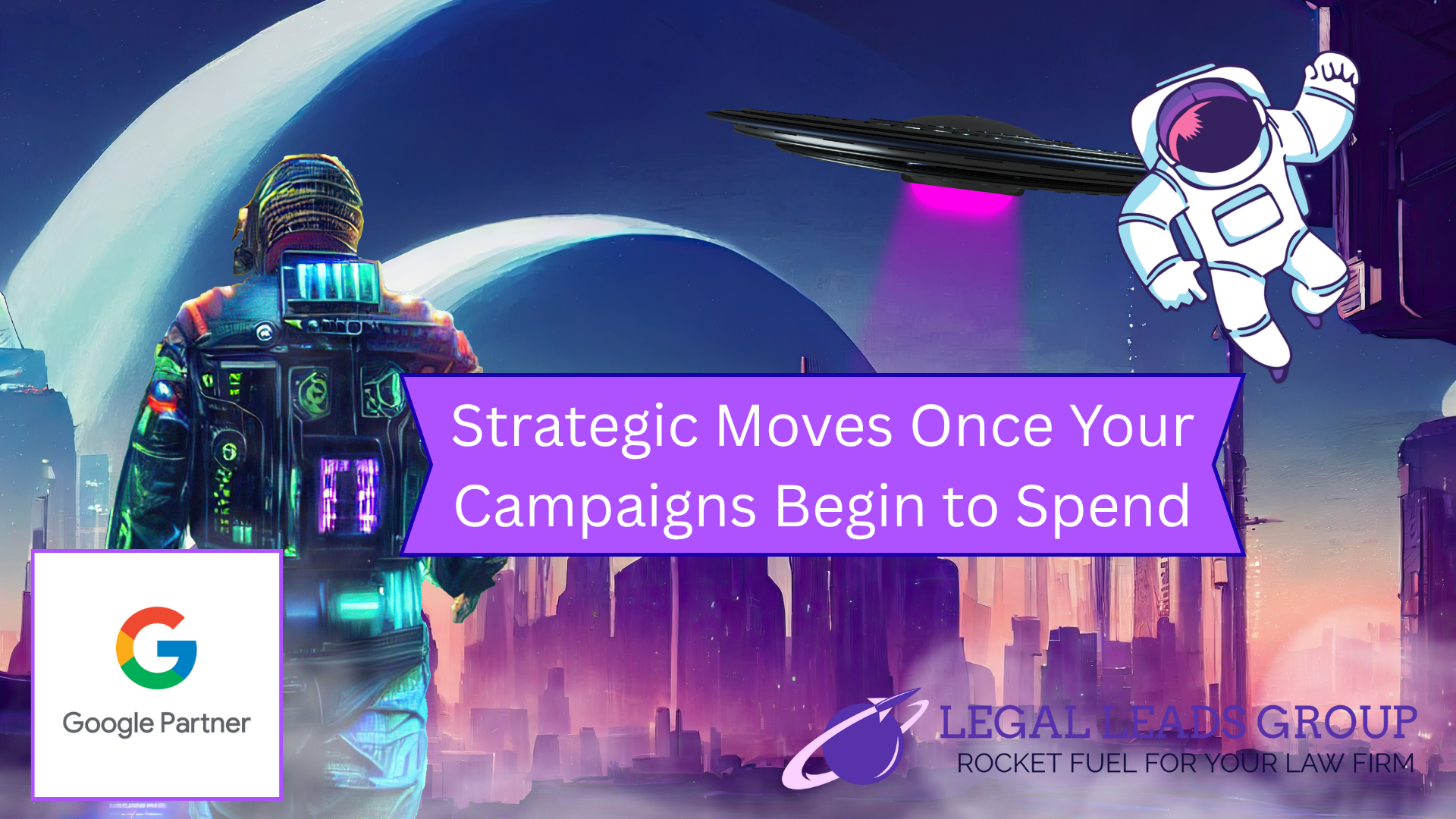
What Happens with Data and Adjustments After You Get a Campaign to Spend?
After a PPC (Pay-Per-Click) campaign begins spending, it enters a phase of active optimization where data becomes a powerful tool to refine strategy, maximize performance, and improve lead quality. Launching a campaign is only the first step—ongoing analysis and adjustments ensure that the money you spend is yielding quality traffic and meaningful conversions, while reducing inefficiencies and waste.
Understanding what happens after you get a campaign to spend, and knowing what to do with the data it generates, are crucial for continually improving results. Below, we dive deeper into the stages of post-launch analysis, adjustment techniques, and how to scale success.
1. Capturing and Analyzing Campaign Data
When a campaign begins spending, it provides real-world performance data beyond the expectations or initial assumptions in your setup. This data serves as factual proof of audience behavior, search trends, and interaction effectiveness.
Key Data Points to Monitor:
- Impressions:
Impressions show your campaign’s reach—how often your ad is displayed in search results. High impressions with low clicks signal potential issues such as weak ad copy, irrelevant targeting, or unappealing offers. Conversely, low impressions could mean restricted targeting, low bids, or underutilized budget. - Clicks and Click-Through Rate (CTR):
A steady flow of clicks is a positive sign, but CTR (the ratio of clicks to impressions) is the deeper indicator of ad effectiveness. A low CTR often means your ads aren’t resonating with the audience. - Conversions:
The ultimate measure of campaign success lies in conversions—whether users are completing desired actions, such as filling out a contact form, calling your firm, or scheduling a consultation. Tracking conversion rates helps validate keyword targeting and ad relevance. - Search Query Reports:
Understand how users are finding your ads by analyzing the specific search queries triggering them. This information is vital for refining your keyword strategy and adding negative keywords to block irrelevant traffic. - Device and Location Performance:
By examining performance across devices (mobile vs. desktop) and geographic locations, you can identify trends and adjust focus to maximize results. - Ad Placement Data:
If your ads are showing up in undesirable locations or platforms (e.g., low-value display ads), it’s time to refine placement settings. - Cost Metrics:
- Cost-per-Click (CPC): Understand if you’re paying a reasonable amount per click relative to your industry and competition.
- Cost-per-Acquisition (CPA): Gauge how much you’re spending to acquire quality leads and whether it fits your ROI goals. High CPA may signal inefficiency or wasted clicks.
2. Making Targeted Adjustments
Raw data is valuable, but actionable insights come from using it to make targeted adjustments that better align your campaign with desired outcomes or fix inefficiencies. Here’s how to approach post-spend optimization:
Keyword Optimization:
- Refine Keyword Selection:
Start by pausing or removing keywords that generate clicks but not conversions—these are wasting your budget. Similarly, prioritize high-converting keywords by increasing their bids for maximum visibility in the auctions. - Negative Keywords:
Use search query reports to identify irrelevant terms triggering your ads (e.g., “cheap accident lawyers”) and add them as negative keywords to prevent low-quality clicks. - Expand the Keyword Base:
If you spot new search terms driving valuable traffic, add them to your campaign strategy as phrase or even exact match keywords for precise targeting.
Ad Copy Adjustments:
- Rewrite Headlines for Impact:
Data on CTR and ad relevance score can guide you to improve headlines so they better align with user intent, highlight unique value propositions (“98% Success Rate in Injury Claims”), or include callouts like geographic targeting (“Serving Houston Car Accident Victims”). - Improve CTAs:
Calls-to-action like “Get Your Free Case Review Today” or “Contact Our Team Now” should be tested and fine-tuned to stimulate conversions. Weak CTA performance can suggest vagueness or lack of urgency. - A/B Testing:
Run variations of ads with small changes in headline, copy, and CTA, while keeping other elements constant. Over time, settle on the versions that resonate most with your audience.
Adjust Bidding Strategies:
- Increase Bids for High-Performing Keywords:
Allocate budget more aggressively to keywords or ad groups with high conversion rates. This ensures your best-performing ads retain visibility in competitive auctions. - Lower Bids for Underperforming Keywords:
Keywords with high CPC but low conversions should see lower bids until their performance improves, reducing budget waste. - Enable Smart Bidding:
Google’s tools like Target CPA or Maximize Conversions use AI-driven algorithms for automated bidding, adjusting bids dynamically based on conversion likelihood.
Audience Refinement:
- Geographic Targeting Adjustments:
If impressions and conversions are strongest in specific areas, scale up geographic targeting in those regions and reduce spend in poorly performing zones. - Segment Audiences Based on Performance:
Use campaign data to identify audience demographics—age groups, gender segments, income brackets—that respond best. Build specialized ad groups for these segments.
Landing Page Optimization:
Campaign performance depends not only on ads and targeting but also on landing page effectiveness. If you’re driving clicks but conversions remain low, it’s time for deeper analysis of landing page experience.
- Improve Page Speed and Mobile Compatibility:
Slow-loading pages or designs that aren’t mobile-friendly can deter users. Optimize for mobile functionality and ensure reduced load times. - Enhance Content Relevance:
Landing page text should directly reflect the promises made in your ad (e.g., highlighting “Free Case Consultation” if mentioned in the ad copy). - Optimize Lead Forms and CTA:
Make your contact forms simple and visually prominent, and place multiple strong CTAs throughout the page. A confusing layout or excessive form fields can lower conversion rates.
3. Scaling Successful Campaigns
Once high-performing elements are identified, the next step is scaling your campaign to amplify successful strategies while building new campaigns based on your findings.
Scaling Techniques:
- Increase Budget on Winners:
- Identify the ad groups, keywords, and geographic areas driving the best ROI and increase daily budget allocation for those segments.
- Expand Geographically:
- If campaigns show strong conversion rates locally, test regional or national expansion using similar targeting criteria.
- Launch Related Niches:
- For example, if your “car accident lawyer” campaign performs well, test campaigns targeting other niches like “motorcycle accident attorney” or “truck collision representation.”
4. Automating Processes and Advanced Refinements
With ongoing data accumulation, your campaign can evolve into an automated system that becomes smarter and more efficient over time.
Automation Tools:
- Use Retargeting Campaigns:
Re-engage users who visited your site but didn’t convert. Focus ads on reminding them of your offer or providing new incentives. - Implement Lookalike Audiences:
Create lookalike audiences based on past leads or conversions. These groups resemble individuals who have previously interacted successfully with your ads. - Enable Dynamic Ad Adjustments:
Use Google’s machine learning tools to adapt ad placements and content dynamically, prioritizing engagement levels.
5. Reporting and Cycles of Optimization
Regular reporting and iterative optimization cycles ensure campaigns stay relevant and productive. Results can fluctuate depending on external factors like seasonality or market competition.
Ongoing Improvements:
- Weekly Reports:
Examine short-term fluctuations in impressions, clicks, CTR, and conversions and adjust bids or keywords based on patterns. - Data-Driven Testing:
Use insights from A/B tests and experiments to drive incremental gains in performance over time. - Revisit ROI Benchmarks:
Check whether CPA and ROI align with your long-term goals and adjust campaign priorities based on profitability.
Getting Your Personal Injury Attorney Google Ad Campaigns to Spend is Crucial for Success
After your campaign begins to spend, it enters a data-driven refinement phase where every adjustment contributes to better results. The process requires consistent monitoring, strategic experimentation, and scalability. By analyzing data and making targeted adjustments, you’ll optimize your efforts to maximize the quality of leads, reduce costs, and scale high-performing strategies to levels that consistently yield better conversions and ROI.
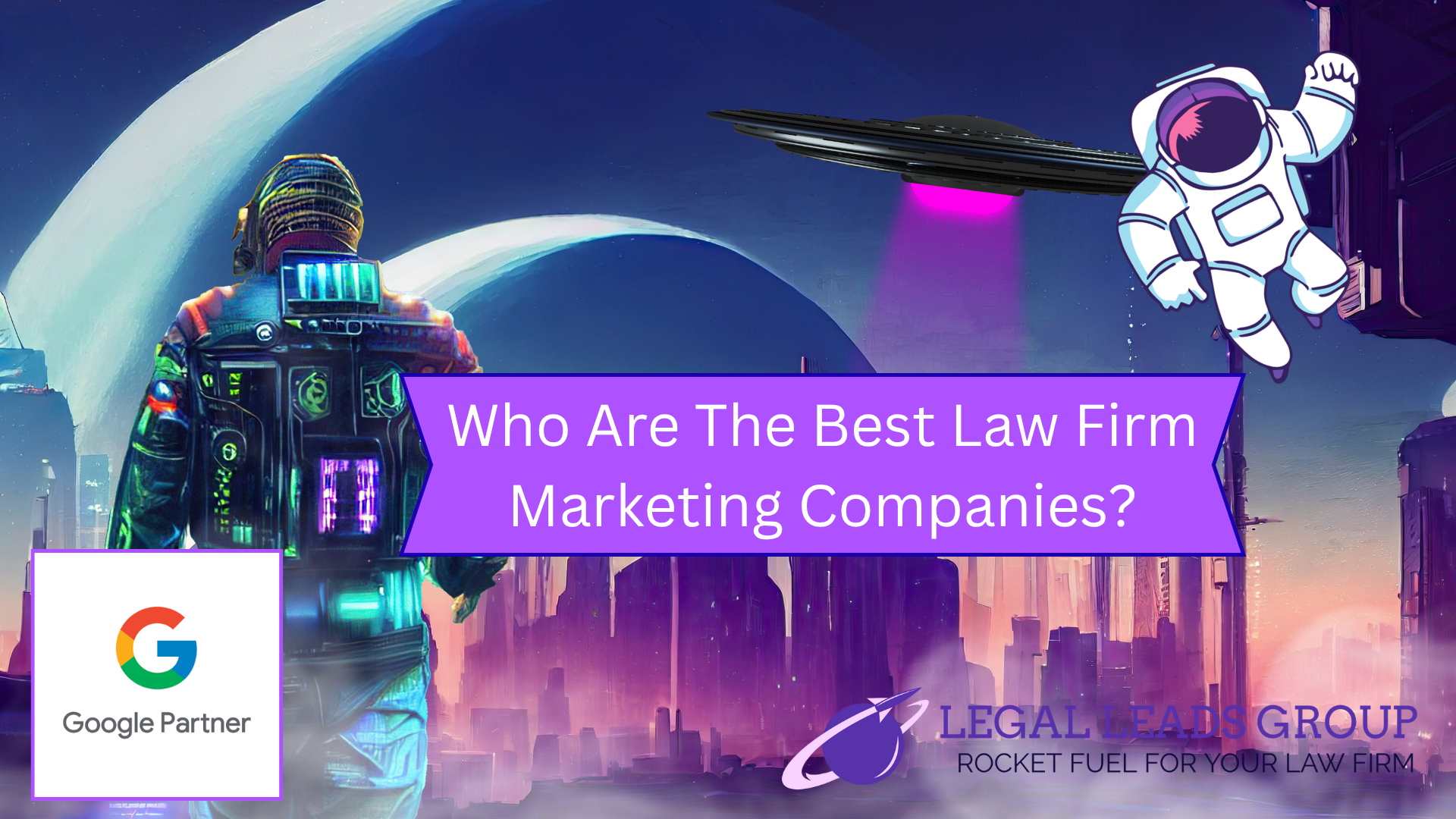
Who is the Best Law Firm Marketing Company for Personal Injury Attorney Google Ads?
The legal industry is one of the most competitive fields for online advertising, particularly when it comes to personal injury law. Running Google Ads for personal injury attorneys requires deep expertise in legal marketing, solid industry-specific keyword strategies, and advanced targeting techniques to maximize ROI. With high costs-per-click (CPC) and cutthroat competition on platforms like Google Ads, choosing the best law firm marketing company is crucial for achieving real results and driving qualified leads.
In this guide, we explore what makes a great marketing company for personal injury attorneys, key services they offer, and top contenders in the space.
What Makes a Google Ads Marketing Company the Best for Personal Injury Attorneys?
Not all marketing agencies are created equal, especially in the challenging world of personal injury. To identify the best marketing company, you need to evaluate whether they offer specialized skills, data-driven strategies, and a proven track record of success in your practice area. Below are essential qualities to look for:
1. Expertise in Legal Marketing
Personal injury law marketing differs significantly from other industries. The winning company must:
- Be familiar with high-value keywords such as “car accident lawyer,” “slip and fall attorney,” “workers’ compensation claims,” etc.
- Understand legal ethics and advertising compliance (e.g., ABA rules) to ensure that your ads stay within ethical boundaries.
- Recognize the nature of high-intent searches, targeting users closer to making legal decisions.
2. Experience Managing High CPC Campaigns
Keywords in personal injury Google Ads campaigns can cost anywhere from $50 to $400+ per click, depending on the geographic location and competition. The best marketing company will:
- Maximize the value of each click by driving relevant traffic to your site.
- Minimize wasteful spending on unqualified leads with proper targeting and the use of negative keywords.
- Demonstrate expertise with high-budget campaigns for law firms while maintaining profitability.
3. Results-Driven Strategies
The ideal agency will focus not just on traffic but on conversions, helping you turn clicks into actual leads. This includes:
- Strategic ad copywriting and compelling call-to-action (CTA) phrases like “Get Your Free Case Review Today.”
- Optimizing landing pages to maximize conversions from users who click on your ads.
- Actionable reporting to outline performance metrics such as CTR, CPA, and ROI.
4. Proven Track Record
Look for Google Ads agencies with case studies, testimonials, or a portfolio demonstrating success specifically for personal injury attorneys. Any credible agency should provide data showing significant lead generation and ROI improvements for their law firm clients.
5. Services Offered Beyond Google Ads
While Google Ads might be the driving force of your paid search campaign, the best law firm marketing companies often provide complementary services:
- Landing Page Design: High-quality, conversion-focused landing pages that capture leads effectively.
- SEO Integration: Organic search optimization to augment your paid traffic efforts.
- Retargeting: Remarketing campaigns to re-engage users who visited your website without converting.
Factors to Consider When Choosing a Marketing Partner
Today’s article has touched on how to jumpstart a personal injury attorney Google Ads campaign. However, there are other elements in addition to PPC, such as LSAs, SEO, social, and traditional ads, such as TV and Radio. When selecting the best marketing company for personal injury Google Ads, consider the following:
- Budget: Ensure the agency can work within your advertising budget while providing measurable ROI.
- Customization: Look for companies that provide tailored strategies rather than one-size-fits-all solutions.
- Transparency: Choose an agency that offers clear, detailed reporting on metrics such as CTR, CPA, and conversion rates.
- Legal Experience: Prioritize companies specializing in legal marketing, as they understand the nuances of personal injury law.
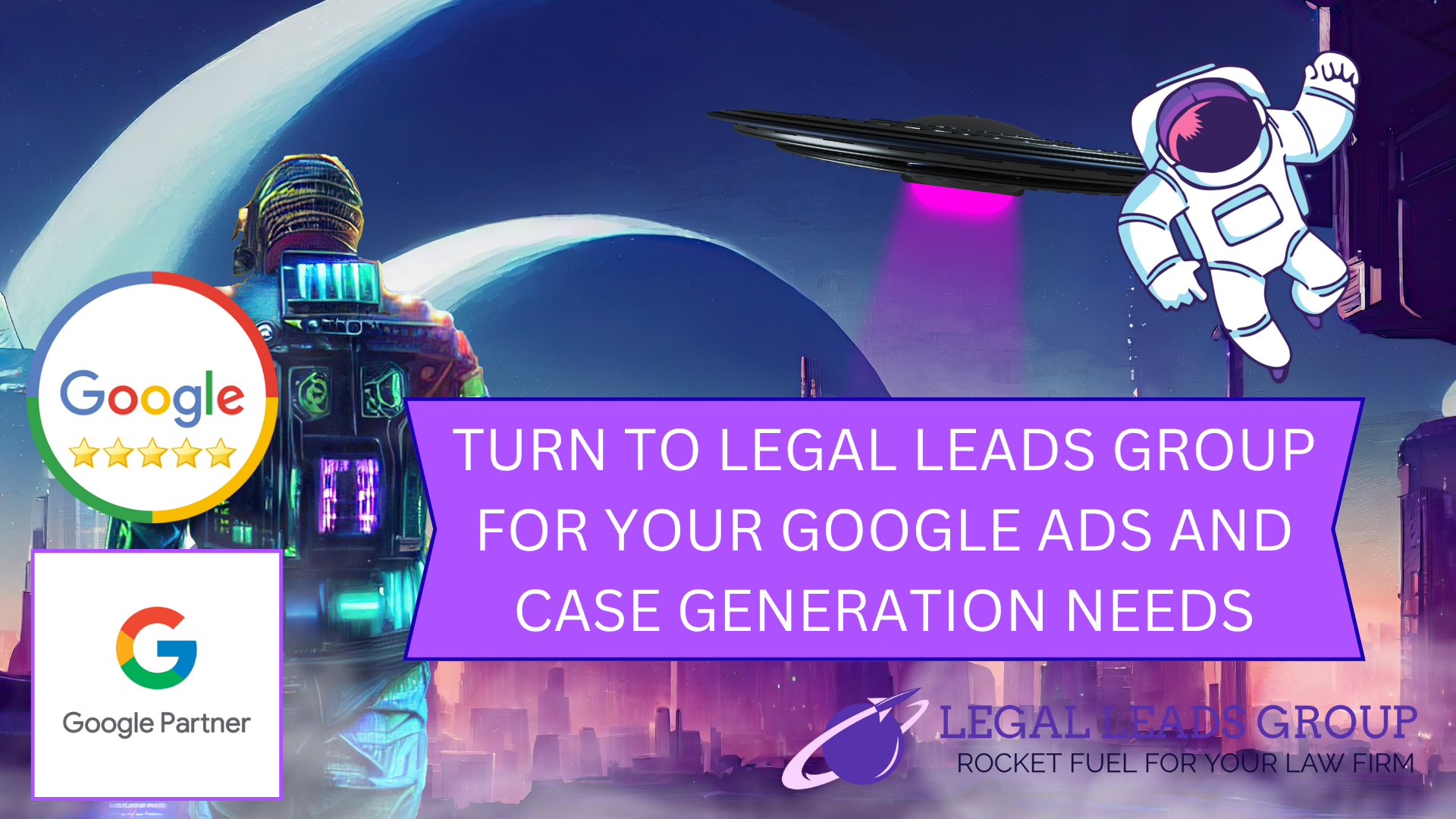
Turning to Legal Leads Group to Jumpstart a Personal Injury Attorney Google Ads Campaign
Legal Leads Group has established itself as a trusted partner for personal injury attorneys looking to dominate Google Ads campaigns. With years of expertise in legal marketing, the company understands the unique challenges attorneys face in high-cost-per-click (CPC) advertising environments. Their approach goes beyond simply driving traffic; Legal Leads Group focuses on attracting high-intent leads who are ready to take action, ensuring that your ad spend delivers quality results and meaningful conversions. Personal injury law is one of the most competitive fields in paid search advertising, and Legal Leads Group is equipped to craft strategies that maximize your return on investment (ROI) while keeping wasted clicks to a minimum.
One of their standout features is the ability to create hyper-targeted campaigns tailored to your specific personal injury niche, whether it’s car accidents, medical malpractice, or premises liability. Legal Leads Group carefully selects keywords that resonate with prospective clients actively searching for a solution to their legal problems. Additionally, they use advanced data analytics and bidding strategies to refine campaigns in real time, adjusting ad copy, placements, and search terms for optimal performance. With Legal Leads Group’s comprehensive approach, personal injury attorneys can focus on serving clients while trusting that their Google Ads campaigns are generating cost-effective, high-quality leads.
